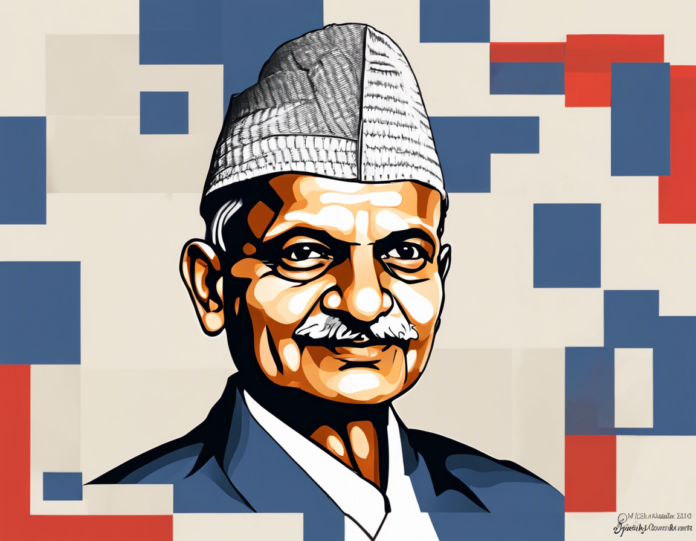April 2nd marks the birth anniversary of the second Prime Minister of India, Lal Bahadur Shastri. Born in 1904, this great leader played a pivotal role in the Indian independence movement and later in shaping the destiny of independent India. His simplicity, integrity, and strong leadership during a crucial period in the history of the nation make him an icon revered by many to this day.
Early Life and Entry into Politics
Lal Bahadur Shastri was born in Mughalsarai, Uttar Pradesh, in a humble family. His journey into politics began in the 1920s when he joined the Indian independence movement led by Mahatma Gandhi. Inspired by Gandhi’s principles of non-violence and civil disobedience, Shastri quickly rose through the ranks of the Congress party.
Contribution to the Freedom Struggle
Shastri actively participated in various movements against British rule, including the Salt Satyagraha and the Quit India Movement. His relentless efforts and unwavering commitment to the cause of independence earned him the respect of his peers and the common people alike.
Vision for a Progressive India
After India gained independence in 1947, Lal Bahadur Shastri held several key ministerial positions in the government. His tenure as the Prime Minister from 1964 to 1966 was marked by his emphasis on social justice, economic development, and national unity. Shastri’s famous slogan “Jai Jawan, Jai Kisan” (“Hail the Soldier, Hail the Farmer”) encapsulated his vision of a self-reliant and strong India.
Achievements and Legacy
During his short but impactful term as Prime Minister, Shastri made significant contributions to various fields, including agriculture, education, and foreign policy. He led the country during the Indo-Pakistani War of 1965 with courage and determination, ultimately securing a peaceful resolution through the Tashkent Agreement. Shastri’s legacy continues to inspire generations of Indians to uphold the values of simplicity, honesty, and service to the nation.
Remembering Lal Bahadur Shastri
On his birth anniversary, it is essential to reflect on the life and legacy of Lal Bahadur Shastri and draw inspiration from his principles of humility and selfless service. His leadership during challenging times serves as a guiding light for all those who strive for a better and more inclusive society.
Conclusion
Lal Bahadur Shastri’s contributions to the freedom struggle and his vision for a progressive and united India make him a towering figure in the annals of Indian history. As we honor his memory on his birth anniversary, let us reaffirm our commitment to upholding the values of truth, simplicity, and integrity that he embodied throughout his life. Lal Bahadur Shastri’s legacy will continue to inspire generations to come in their pursuit of a more just and equitable society.
Frequently Asked Questions (FAQs)
1. What were Lal Bahadur Shastri’s key contributions to the Indian independence movement?
Lal Bahadur Shastri actively participated in various movements against British rule, such as the Salt Satyagraha and the Quit India Movement. His commitment to the cause of independence and his leadership qualities garnered widespread respect.
2. How did Lal Bahadur Shastri’s slogan “Jai Jawan, Jai Kisan” reflect his vision for India?
The slogan “Jai Jawan, Jai Kisan” emphasized the importance of both the soldier and the farmer in nation-building. Shastri believed in the need for a self-reliant and strong India, with a focus on agriculture and national security.
3. What were some of the key achievements of Lal Bahadur Shastri during his tenure as Prime Minister?
Shastri made significant contributions to agriculture, education, and foreign policy during his term as Prime Minister. His leadership during the Indo-Pakistani War of 1965 and the subsequent Tashkent Agreement are among his notable achievements.
4. How is Lal Bahadur Shastri’s legacy relevant in today’s world?
Lal Bahadur Shastri’s values of simplicity, honesty, and service to the nation hold great relevance in today’s world. His leadership during challenging times and his emphasis on social justice and national unity serve as guiding principles for contemporary leaders.
5. How can we commemorate Lal Bahadur Shastri’s birth anniversary in a meaningful way?
One can commemorate Lal Bahadur Shastri’s birth anniversary by organizing events that highlight his life and contributions, promoting his ideals of honesty and integrity, and engaging in acts of service and kindness in his memory. Additionally, spreading awareness about his legacy through social media and educational programs can help keep his memory alive.

